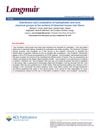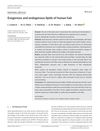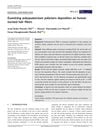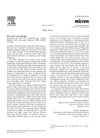Treating hair loss in PCOS involves a combination of lifestyle changes, medication, and possibly hair care strategies.
 3 citations,
October 2020 in “Dermatology Reports”
3 citations,
October 2020 in “Dermatology Reports” Many women in North West Saudi Arabia use herbal and home remedies for hair care, often learning about them through family and media.
[object Object] January 2024 in “Journal of pharmacognosy and phytochemistry” The herbal hair mask made from natural ingredients is safe, effective, and affordable for hair care.
 10 citations,
May 2015 in “International Journal of Women's Dermatology”
10 citations,
May 2015 in “International Journal of Women's Dermatology” New treatments for skin and hair disorders in women of color address unique biological differences and include specific acne medications, sunscreens, skin lighteners, and hair care adjustments.
 434 citations,
October 2003 in “PTR. Phytotherapy research/Phytotherapy research”
434 citations,
October 2003 in “PTR. Phytotherapy research/Phytotherapy research” Natural products in cosmetics are beneficial for skin and hair care with low toxicity.
 72 citations,
July 2008 in “Dermatologic Therapy”
72 citations,
July 2008 in “Dermatologic Therapy” CCCA is a scarring hair loss condition mainly in African descent women, possibly caused by genetics and hairstyling, treated with gentle hair care and medications.
[object Object] 53 citations,
July 2016 in “Cosmetics” Future hair cosmetics will be safer and more effective.
44 citations,
November 2012 in “International journal of nanomedicine” A new method improves silicone oil coating on hair, enhancing moisture and lubrication.
 36 citations,
October 2014 in “Langmuir”
36 citations,
October 2014 in “Langmuir” Bleaching hair removes its protective top layer and exposes more hydrophilic groups, changing its chemical surface and affecting how it interacts with products.
 32 citations,
November 2012 in “Aesthetic Surgery Journal”
32 citations,
November 2012 in “Aesthetic Surgery Journal” Hair restoration surgery has advanced, focusing on natural results and may improve further with new techniques and therapies.
 28 citations,
August 2013 in “Facial Plastic Surgery Clinics of North America”
28 citations,
August 2013 in “Facial Plastic Surgery Clinics of North America” Body and beard hair can be used for hair restoration in severely bald patients, but the technique is complex and costly.
26 citations,
April 2010 in “The American journal of dermatopathology/American journal of dermatopathology” Researchers created a standard system to grade hair damage using microscopic images.
 25 citations,
September 2010 in “Journal of Cutaneous Medicine and Surgery”
25 citations,
September 2010 in “Journal of Cutaneous Medicine and Surgery” The study found that Central Centrifugal Cicatricial Alopecia mainly affects middle-aged African descent women, is linked to certain hair care practices and genetics, and often goes undiagnosed for years.
 23 citations,
January 2018 in “Elsevier eBooks”
23 citations,
January 2018 in “Elsevier eBooks” Nanoemulsions improve stability and delivery of active ingredients in cosmetics for skin and hair care.
 21 citations,
March 2017 in “Skin research and technology”
21 citations,
March 2017 in “Skin research and technology” Removing external lipids from hair reduces moisture and increases strength, while removing internal lipids decreases water permeability.
19 citations,
September 2005 in “International Journal of Dermatology” African-American hair's curl pattern significantly affects its strength and elasticity.
 13 citations,
August 2019 in “Journal of Ethnopharmacology”
13 citations,
August 2019 in “Journal of Ethnopharmacology” Eleven traditional Polynesian plants show potential for natural anti-aging, hair growth, and skin brightening products.
 11 citations,
January 2004 in “Exogenous dermatology”
11 citations,
January 2004 in “Exogenous dermatology” Outside factors like grooming, chemicals, and the environment can damage hair and cause disorders.
11 citations,
June 2018 in “Annales de dermatologie et de vénéréologie” Hair care products can cause skin irritation and allergies.
7 citations,
October 2019 in “Frontiers in bioengineering and biotechnology” Fusion proteins can protect hair from heat damage.
 7 citations,
January 2017 in “Clinical and medical investigations”
7 citations,
January 2017 in “Clinical and medical investigations” Suriname uses many plants for beauty, with potential for a beauty industry, but more evidence is needed for product effectiveness.
4 citations,
January 2017 in “International journal of trichology” Castor oil can cause severe hair matting.
 4 citations,
November 2017 in “Journal of Cosmetic Dermatology”
4 citations,
November 2017 in “Journal of Cosmetic Dermatology” Certain polymers can stick to hair and increase volume, working best at a pH of 7 to 9.
4 citations,
March 2007 in “Annales de Dermatologie et de Vénéréologie” Hair care products can cause skin irritation and allergies due to certain chemicals.
4 citations,
January 1988 in “Cosmetics and toiletries” 0.1% piroctone olamine in hair tonics effectively treats dandruff.
 3 citations,
December 2003 in “Micron”
3 citations,
December 2003 in “Micron” The book "Hair Science and Technology" provides a deep understanding of hair biology and genetics, discusses hair growth, density, and diseases, and offers methods for managing hair loss and caring for hair growth.
2 citations,
January 2022 in “Materials today: proceedings” Caffeine may be good for hair growth and skin care because it binds well with keratin.
2 citations,
July 2018 in “Skin research and technology” Greasy hair spreads sebum twice as much as nongreasy hair over time.
 2 citations,
March 2005 in “International Journal of Cosmetic Science”
2 citations,
March 2005 in “International Journal of Cosmetic Science” Human hair structure varies by ethnicity, and certain treatments can improve hair condition and appearance.
 1 citations,
August 2022 in “Chemical engineering journal advances”
1 citations,
August 2022 in “Chemical engineering journal advances” Scientists made human hair magnetic by coating it with special nanoparticles.
















